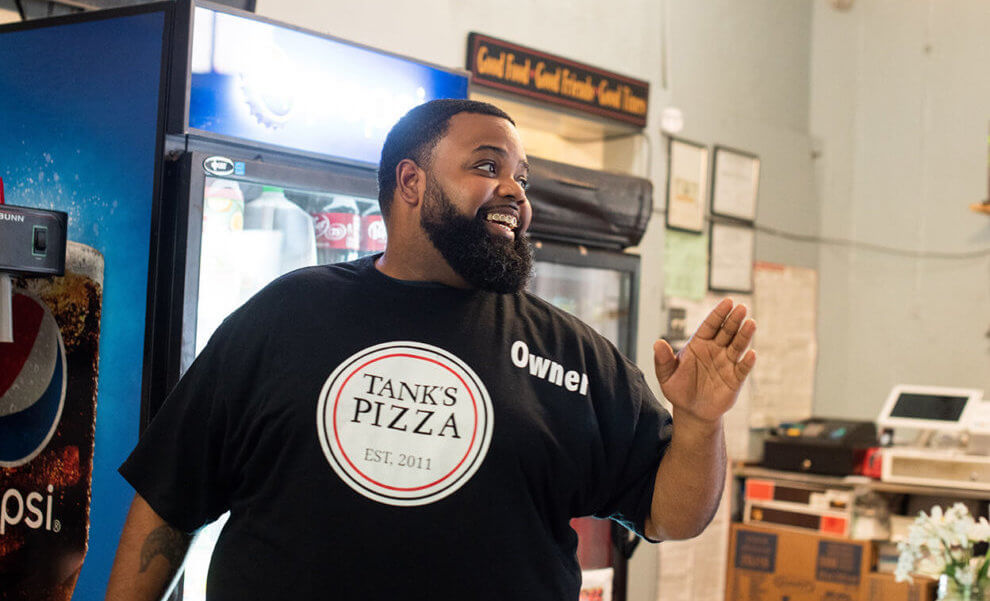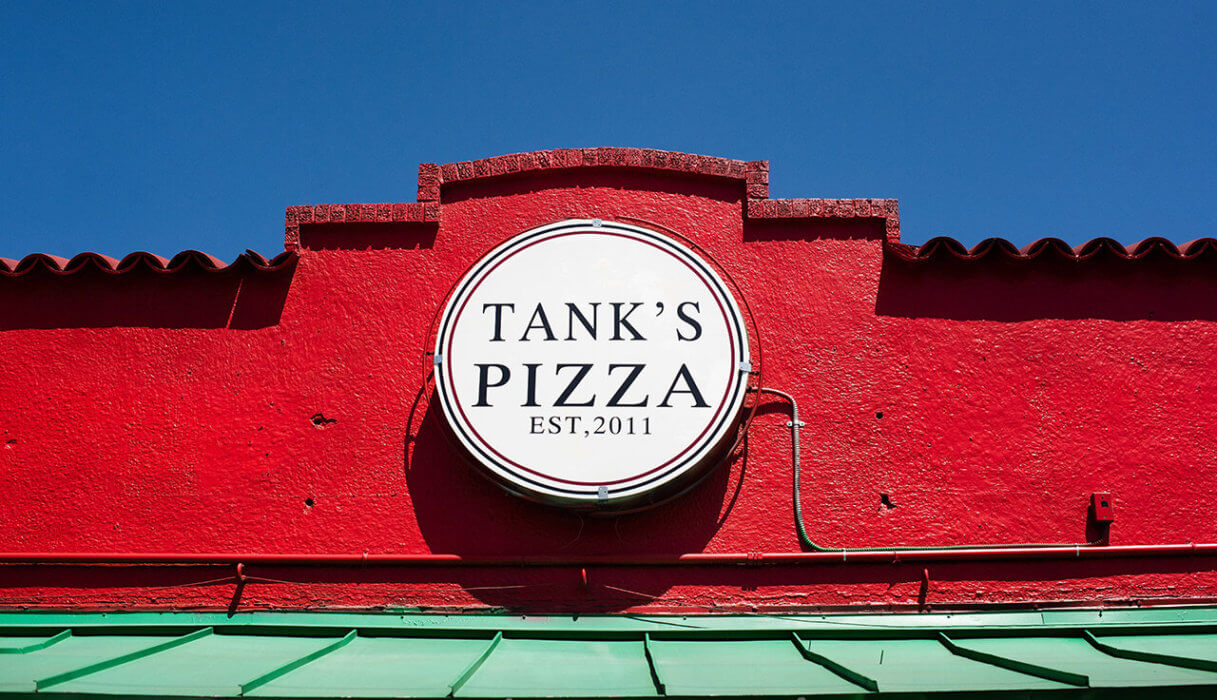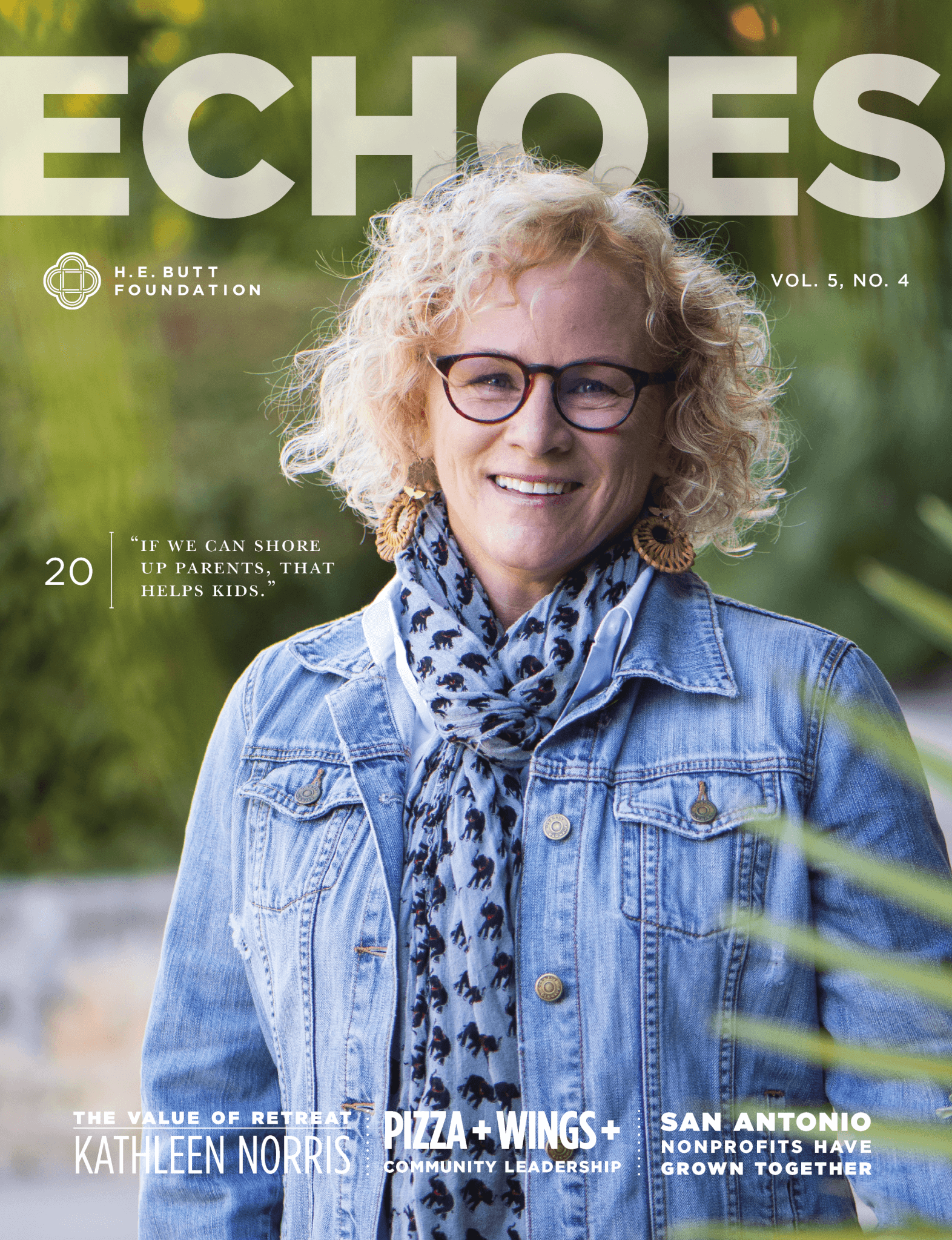
Growing up as a kid on San Antonio’s West Side, Mike Brown found joy cooking with grandma in the kitchen, eating her homemade pomegranate ice cream, and drinking the sweet tea she stored in jugs and hung from the fence line.
Brown, 39, brings that same joy to San Antonio’s East Side with pizza, calzones, and some of the best finger-licking wings in the city. Directly east of downtown, the East Side is known for its rich Black American culture. As home of the AT&T Center and Freeman Coliseum, it features some of San Antonio’s oldest neighborhoods: Dignowity Hill and Denver Heights.
Since February 2018, Brown has owned Tank’s Pizza, a bright red building on the corner of North New Braunfels Avenue and Hays Street. Before COVID-19, customers typically enjoyed eating in the dining room or on the inviting back patio. These days, you’ll find them placing orders from a small window or waiting outside in their cars for curbside pick- ups.
In recent months, the front wall inside the restaurant has been lined with stacked boxes filled with non-perishable food items donated by random people in the community and Meals on Wheels America. Tank’s delivers cans of food, diapers, and miscellaneous goods to the old Wheatley Courts housing project, now East Meadows. In July, they delivered 80 boxes to community residents.
Why would people drop off donations at a pizza joint?
Mike shrugs. “They know we’ll get it where it needs to go. Maybe they feel embarrassed about giving too little. But I don’t care if you just can drop off one can of food. We’ll put it with 5 more cans. Someone will be thankful to get it.”
► WATCH: Mike talks about pivoting
|
He loves giving back.
He loves his team.
“This”—all the giving and striving—“isn’t Mike, this isn’t Tank’s, this is my family,” he says. “When all this happened, they were all willing to do whatever necessary so we could stay open.”
Even with the pandemic, thoughts of leaving or closing never crossed his mind. Challenges are nothing new.
Until last year, Tank’s sat across the street from Hayes Food Mart, a former convenience store and gas station that served as a hub for shootings, fights, and drugs. Neighbors pulled together, and it was eventually shut down. Still, many people questioned Brown’s decision to stay.
“We could’ve relocated on any side of town. I believe it would’ve been successful, but I wanted to be right here,” says Brown. He’s employed lots of locals, and he’s given teenagers odd jobs in the summers to keep them busy. He helped the intersection of New Braunfels and Hays turn the corner. “This is my community, too.”
Raised by his grandparents, Brown grew up in Lincoln Courts, an affordable housing complex on the West Side. He took care of his younger siblings while his grandparents worked. That’s how he first learned to cook.
His grandfather taught him how to save. “He had a dime jar, a quarter jar and always saved what he could. It had to be at least 12 years of him saving,” says Brown. He remembers thinking his grandaddy was rich, walking into the bank with huge sacks of change.
► WATCH: Mike talks about growing up in San Antonio. |
Like his grandfather, Brown spent years saving. After setting aside seven years of his income tax returns, he bought out his business partner and became the sole owner of Tank’s in 2018.
“When you come from nothing, you respect everything. And I came from nothing, no gifts, no handouts, no boots. Everything I had to get, I had to grind for,” he says.
His grind comes from his past. He’s always had a side hustle. In high school, he earned extra money making complex dishes as a personal chef for his principal. “She loved complex dishes, and one of her favorites was sushi,” he remembers.
Brown says people in his home economics class assumed he couldn’t cook. “All of my classmates were girls, and I was the only guy. So I think people naturally thought I couldn’t cook, but I actually came in quite advanced,” said Brown.

He’s definitely no stranger to being underestimated or stereotyped. He’s even had to deal with it in his own restaurant.
“When we were open and before COVID, every other week someone would walk in here asking for the owner. They’d see me, then they’d see Doug,” he says, referring to one of his managers. “Because Doug is white, they just assumed he was the owner. It became comical.”
► WATCH: Valuable lessons Mike shares with his employees. |
Regardless, Brown wouldn’t work a typical job. He learned some valuable life lessons in his early 20s. After working a few years at Jack In the Box and Pizza Hut, he says he knew that he would be a successful business owner.
“I’ve always been able to do anything I put my mind to, and working in the food industry helped me realize I am an entrepreneur,” he says. “I don’t think I’d be able to work for anyone anymore because the quality of work I would put in for someone else, I can do it ten times as much for myself.”
Brown instills the same entrepreneurial mindset into his children. He knows the playing field is unlevel from the beginning, so he’s doing all he can to give his kids a step up.
His thirteen-year-old daughter, Alayla, can count the drawer, operate the POS (point-of-sale) machine and understand profit margins. His nine-year-old son, Junior—”Juju”—isn’t quite there yet. That doesn’t stop Brown from talking to his kids about business, investing, and saving. They have jars, too.
“I wasn’t having those conversations as a kid,” says Brown. “I want them to have a dad they can be proud of. Someone like my grandfather was to me.”
► WATCH: Mike talks about generational wealth. |
He hopes they’ll go to college and maybe even have their own businesses. But for now, he’s okay with the kids just being kids. He wants to protect them.
Brown talks with his kids all the time. But he isn’t looking forward to having the race-talk. In spite of the recent racial-reckoning, he’s in no rush. He says they already know, for the most part, that their lives will always be different.
“The time will come when I will have to talk to them. The system is set up for the white man to be on top.” But, he says, “I hate talking about race. We shouldn’t have to, but it’s one of those realities. It’s like a bill; you know it’s coming.”
Brown doesn’t yet talk about racism with his kids, and in some settings, he’s careful about sharing specific details about his own experiences with racism and his past. But he chooses his spots. In the right place and for the right reason, he’ll talk about the harder parts of his life.
Earlier this year, Brown began to partner with Charles Foltz, co-founder of SA Heals, a local nonprofit on the East Side, to engage in hard-hitting conversations about race and inequity with a wide range of San Antonio church leaders, police officers, business owners, and other community members.
Together, Brown and Foltz hold meetings they call “immersions” at the SA Heals headquarters, located a short walk from Tank’s Pizza. The goal is to encourage people across the city to overcome the distance between their differences while learning to appreciate humanity in one another.
“The common stereotype is you’re either a victim [or] a villain,” says Foltz. “That’s the false narrative. You have to be willing to sit in a room, have a conversation, and stick it out with a posture of humility.
“Sitting down with Mike, we’ve had great conversations about the East Side and the strong sense of community in this neighborhood,” says Foltz.
For Brown, being a business owner means modeling leadership—not just for his kids, but for every person in his neighborhood. Instead of relocating to a different part of town, he remains rooted so people can see what it looks like for business owners to stay on the East Side and be successful.
“I can remember growing up and how important someone like me would’ve been in my community as a young Black man,” says Brown. “It makes a huge difference.”

Hilary Monford has been partnering with Laity Lodge Family Camp to offer accessible counseling and therapy to families during a particularly difficult year.
After three years together in the Foundation’s program, a cohort of San Antonio nonprofits have deep and lasting relationships to sustain their work together.
Deep in the heart of Texas’ hill country, the stars aren’t competing with light pollution from cities and suburbs.
